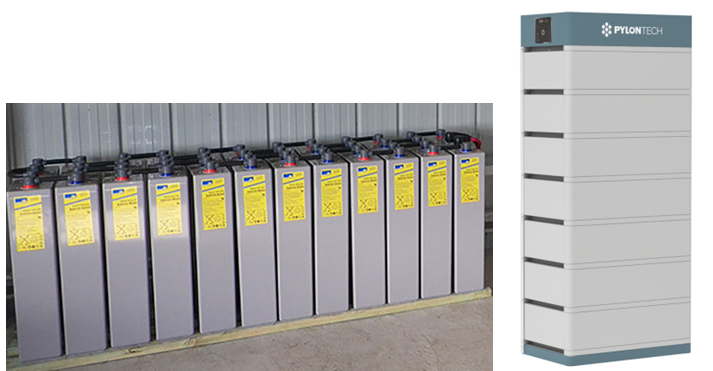 Off-Grid Solar Australia
Off-Grid Solar Australia

Powerwall vs. Lead Acid Batteries – Which is the Best Choice for Your Off-Grid Lifestyle?
Off-grid living has become a practical option for many households as renewable energy sources gain popularity. Off-grid living relies heavily on energy storage since it makes it possible to offer dependable power even when the sun and wind don’t work in favor.
In this article, we will contrast two well-liked energy storage options: Tesla’s Powerwall, a lithium-ion battery system, and lead acid batteries, an established technology that has been around for many years. To assist you in selecting which is ideal for off-grid living based on the most recent information available, we will assess their features, benefits, and limits.
Powerwall Tesla, a pioneer in electric vehicles and renewable energy, created the state-of-the-art lithium-ion battery system, Powerwall. It is a stylish little unit that can be installed on a wall to save space and give the room a more contemporary appearance. Both of the Powerwall models—Powerwall 2, with a 13.5 kWh capacity, and Powerwall 3, with a 14 kWh capacity—offer plenty of storage for off-grid habitation.
Benefits of Powerwall
Restrictions of Powerwall
Lead Acid Batteries
Lead acid batteries have been a well-established technology used for energy storage for many years because they are dependable, affordable, and frequently employed in off-grid applications. There are several lead acid batteries, including flooded, sealed, and gel batteries, each with advantages and disadvantages.
Benefits of Lead Acid Batteries
Restrictions of Lead Acid Batteries
Conclusion
Lead acid batteries and Tesla’s Powerwall have advantages and disadvantages for off-grid energy storage. Lead acid batteries are affordable, robust, and readily accessible whilst high efficiency, longevity, scalability, and seamless connection with solar panels are all features of Powerwall. When deciding which is best for your off-grid living, consider your unique needs, financial situation, and availability.
G’day, Australia! We’re here to shake things up in the energy world, right? We’ve got these ripper solar systems, decked out with the latest Sungrow and Deye inverters and those beaut Sungrow and Pylontech lithium batteries. They’re a real game-changer for places like Ballarat, Victoria, and all over Oz! Our Top Solar Gear Going All …
Continue reading “Givin’ Aussie Homes a Fair Go with Top-Notch Solar Tech”
1. Jinko Solar Panels: 2. Trina Solar Panels: 3. SunPower Solar Panels: Conclusion When choosing solar panels, consider factors such as efficiency, durability, warranty, and budget. Jinko offers cost-effective and reliable options, Trina provides a balance of performance and value, while SunPower stands as a premium choice with top-tier efficiency. Each brand caters to different …
Continue reading “Comprehensive Solar Panel Review: Jinko, Trina, and SunPower”
1. Pylontech Batteries: 2. PowerPlus Energy Batteries: 3. BYD Batteries: 4. Tesla Powerwall: Conclusion When selecting a solar battery, factors like capacity, compatibility, longevity, and budget play crucial roles. Pylontech, PowerPlus Energy, BYD, and Tesla offer diverse options catering to different needs and preferences. Whether for a small residential setup or a larger, more complex …
Continue reading “In-Depth Review of Solar Batteries: Pylontech, PowerPlus, BYD, and Tesla”
Inverter Equipment Review: Sungrow, Deye, Victron, and Selectronic 1. Sungrow Inverters: 2. Deye Inverters: 3. Victron Energy Inverters: 4. Selectronic Inverters: Conclusion Each of these inverter brands – Sungrow, Deye, Victron, and Selectronic – offers unique strengths suited to different solar energy needs. Your choice should depend on your specific requirements, whether it’s for residential, …